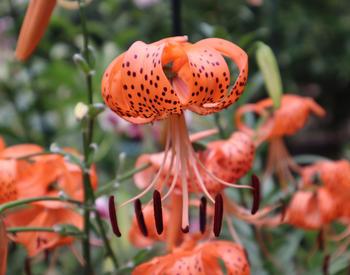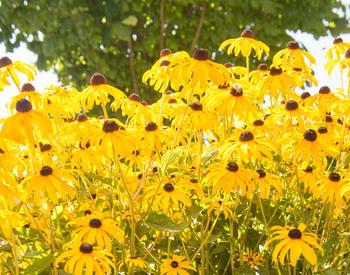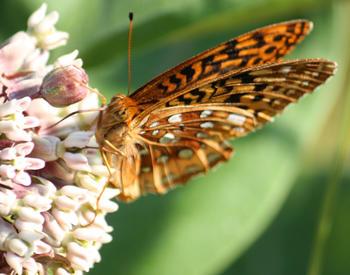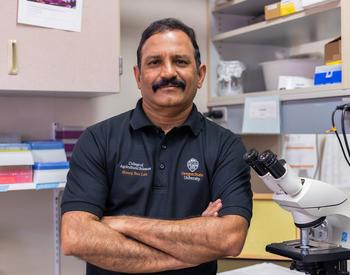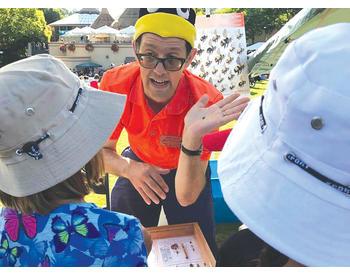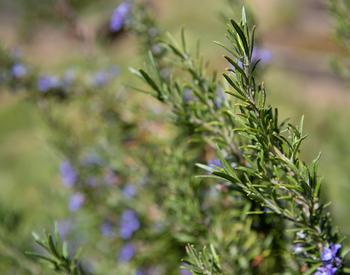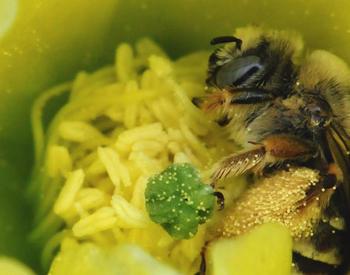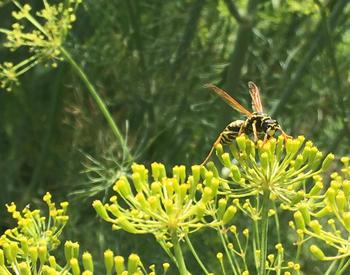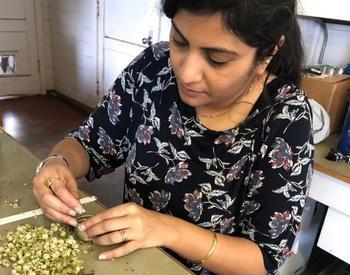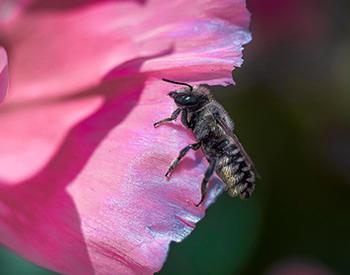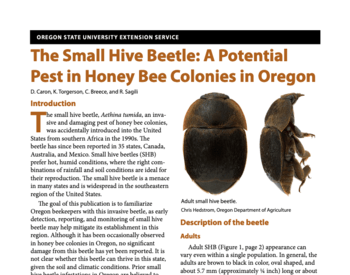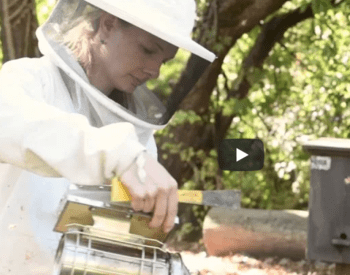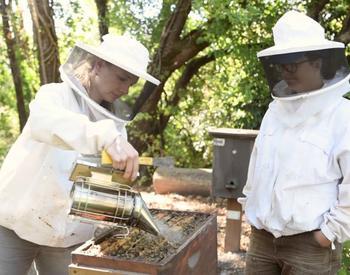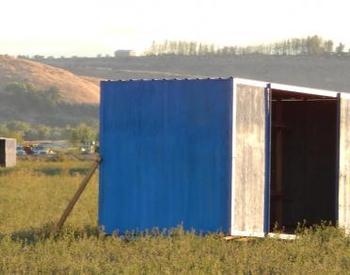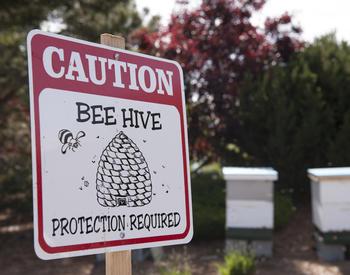Transcript
Speaker 1: From the Oregon State University Extension Service, this is Pollination, a podcast that tells the stories of researchers, land managers, and concerned citizens making bold strides to improve the health of pollinators. I'm your host, Dr. Adoni Melopoulos, assistant professor in pollinator health in the Department of Horticulture.
Frequent listeners of Pollination know I am very easily excitable, but I'm tremendously excited this week because I'm going to be introducing a new segment. It's called the Research Retinue. And for those of you who don't know what a retinue is, it's a sort of aggregation of honeybee workers around a queen.
They get the pulse of what's going on and they transmit it and communicate it to the rest of the hive. And the Research Retinue is very much in that spirit. What it involves is a group of very curious undergraduates here at Oregon State University, Addison DeBoer, Mayerite, Lacey Haig, and Isabella Messer. Each month, they're keeping their eye out for articles in newspapers like The New York Times, The Washington Post, or The Guardian that are highlighting recent research on bees. So they're going to be deconstructing those papers, raising discussions and questions around those papers. It's a really great way for you as listeners to kind of keep on the pulse of all the new stuff that's coming out about bees that you're hearing about, that your neighbors are talking about while listening to the podcast and doing your dishes and potting your plants or whatever you do when you're listening to this podcast. In this first episode, the retinue takes on two papers that got a lot of press in the last month. The first one is by James Hung and his colleagues. The title of the article is The Worldwide Importance of Honeybees as Pollinators in Natural Habitats, which appeared in the Proceedings of the Royal Society on January 10th, 2018. An opinion piece by Jonas Gelman and Juan Gonzalez Barrow in the journal Science titled Conserving Honeybees Does Not Help Wildlife, was published just a week later on the 26th of January, 2018. So without further ado, I'm going to hand this episode over to the research retinue.
Speaker 2: Hello, my name's Addison DeBoer. I'm a biology major and I'm interested in pollinators because I love food.
Speaker 3: My name is Lacey Haig. I am a zoology student and I think pollinators play a really important role in conservation and restoration.
Speaker 4: My name is Umeo Wright. I study environmental science and I think that pollinators are important because they contribute to the food chain.
Speaker 5: Hello, I am Isabella Messer. I'm a horticulture student and I think that pollinators are important because they are such an essential member of our global ecosystem.
Speaker 2: And today we're going to be talking about an article that came out a couple of weeks ago called The Worldwide Importance of Honeybees as Pollinators in Natural Habitats. First, Isabella, will you introduce it to us? Yes.
Speaker 5: So as some of you may know, honeybees provide an incredibly valuable service to a variety of agricultural crops worldwide. And so they are incredibly important to modern agriculture as we know it.
And just because of that, they deserve to be researched about. So this paper specifically looks at three major questions. The first one is determining the proportions of floral visits contributed by the honeybee to individual wild networks worldwide and then looks at the proportions of floral visits to the plants within those networks. The second question examines what environmental factors govern the relative honeybee contribution and whether or not the visitation rates can vary between a native and an introduced range. Finally, the third question is that many pollination network studies often use visitation frequency as a proxy for pollinator importance. So they were looking at how the per-visit pollination effectiveness of the honeybee compared to the effectiveness of other floral visitors. So essentially just comparing the honeybee to other pollinators that may be in any given network. Awesome.
Speaker 2: And now, Lacey, will you describe their methods for the study?
Speaker 3: In the methods section, the authors examined two types of studies, the first looking at what bees were visiting the floral resources and the second, how effective they were at pollination. Ultimately, they boiled down the compilation of articles based on the following criteria. They had to be focused on the natural habitats. They had to have more than five plant species found in the study area. The study had to document a broad range of pollinators while excluding studies that did not include or observe malifera and studies that had a narrow bee diversity observed. The information used from these studies included not just geographical data, but also the proportion of all floral visits contributed to malifera, the proportion of plant species receiving at least one visit by malifera, and the rank of malifera with respect to both the proportion of all floral visits contributed and the proportion of plant species visited. After compiling this information, the authors examining the study sites redistributed the study areas into 80 networks, defining the network as the sum of recorded plant-pollinator interactions in all sites from a single study that fell within a 50-kilometer diameter circle regardless of the number of sites that constitute the network.
Speaker 2: This study came up with a few results that they found comparing all this other research. They found that the honey bee is the most single frequent floral visitor in most of their networks, whether native or introduced. And with that, it's also about as effective as the average of other visitors because it's not a specialist. There are other types of bees that are more effective at certain flowers, but overall it has a pretty similar effectiveness.
The honey bee was not observed in about 33% of the networks that they looked at, which showed that while they're not as common worldwide, non-honey bees are still essential for pollination in the world. And then, Maya, would you like to take us through the discussion?
Speaker 4: So the discussion portion of this article described the significance of millifera. They said that they were the most important single species of pollinators across the natural systems. Only bombers are comparable to millifera. The local abundance of millifera usually visits a minority of insect-pollinated plant species. And then other studies stated that millifera regularly dominated a portion of plant species in different environments.
So there are some contrasting opinions. Different perspectives stated that the millifera disrupted interactions between plants and other pollinators. Then the writer's analysis of the topic stated that the millifera visitation is related to environmental variables like climate and geographical predictors, but they have no effect on the native status. And then they also said that the millifera may influence the fitness and behavior of competing pollinators, enhance or reduce plant production, and facilitate the spread of non-native weeds and pathogens. And then lastly, the section brings up an idea saying that the millifera populations may be able to cope with parasites and pathogens better than managed populations.
Speaker 2: So now that we've kind of summarized the paper, I think this paper is really important because recently there's been multiple articles and opinion pieces coming out about the difference between honeybees as agricultural and the difference between that and wildlife conservation. And that's been a pretty big topic lately.
And so that's what interested me in it. I was interested in hearing your guys' opinions about was this article convincing for you what parts you have questions about and what parts seemed less convincing.
Speaker 3: So I think the study did a really good job of painting with a broad brush. I think it's really hard to quantify a lot of different studies and analyses like this. And I think they did the best that they could with the information that was out there, despite some geographical areas not being covered. I think it's the best way to kind of analyze the different areas.
Speaker 5: I agree with that, Alacey. And I don't know, I found this article to be convincing. Obviously, honeybees are important to agriculture. And this article isn't specifically about agricultural areas. And so they've also done a good job of showing that they're important to wild areas as well. For example, they were the most frequent floral visitor in 17 of the networks, and they visited the most plant species in 14 out of all the networks. They were the only visitors for several plant species in some of the networks. However, I also think that they did a good job of underscoring the importance of non-honeybee pollinators in these networks. As far as agriculture goes, honeybees are the thing. But also, honeybees didn't visit a number of the plants and only the native pollinators who were non-Belifera visited them.
Speaker 3: And I think that's an excellent point to remember that honeybees are not the end-all, be-all of pollinators just because they are widespread and efficient at what they do doesn't mean that they can do the job of all the other pollinators combined.
Speaker 2: And even if they could, would we want them to? Because then we'd be missing out on all of the ecological variation of all the other species.
Speaker 5: Right, of course. A big, homogenous, you know, pollinated population is not going to be sustainable to have a diverse plant population, and then, you know, by relation like a diverse animal population and other insects and so on and so on.
Speaker 2: I like that you brought up the plant population because this article mentions briefly a couple of times the effects of different pollinators on plants especially native and non-native plants, invasive species, that kind of thing. Would you guys like to comment on that? So you brought up plants and one of the things that the article mentions pretty briefly is that the different pollinators that are going to be pollinating different plants and it brings up honeybees and some concerns that honeybees aren't pollinating as many native varieties and maybe they're even pollinating a lot more invasive species. What do you guys think about that?
Speaker 3: I think it's important to remember that honeybees are non-native to a lot of areas, so I think it would be reasonable to understand or expect that they may not pollinate the species that are native in that area because they are not used or they're not typically pollinating those plants in other areas, so that might be something to look at as well.
Speaker 2: The article also mentions that repeated visitors by abundant pollinators like honeybees can damage flowers and reduce their reproductive success and I was thinking about that and then also part of the article that mentions how honeybees, while they're not specialists and they pollinate a wide variety of crops, they don't do as well as the native bees, so that could make a difference on which plants are being pollinated and how well.
Speaker 5: So that makes me want to ask you guys, what do you think is the most important, out of what they study, what indicator of like pollinator relevance I guess? So they looked at the proportion of visitations, the diversity of the plants that they visited, and the effectiveness of their pollination, so I'm curious what you guys think is most important.
Speaker 3: I think it's difficult to assign a label like most important to ecosystem service that the honeybees provide, however I think the effectiveness is something that should carry a little more weight when you're considering a paper like this because if the honeybees or any other species are doing more damage than good, their effectiveness is obviously going to be really low and I say that with the caveat that measuring effectiveness can be somewhat difficult and in the study, there was a lot of differences between the ways that the effectiveness was measured because it was a combination of many different studies, not a single study was looked at, so there was different methods used in each of those papers. So while effectiveness is really important, it's also one of the more difficult things to quantify and analyze.
Speaker 5: Right, so with this article specifically, the ways that they measured the effectiveness was the seed set that the pollinators did, followed by the fruit set, pollen deposition, and finally they looked at like pictures. They used image J and then that was how they determined how effective they were being. So yeah, there was a lot of variety in how they measured effectiveness.
Speaker 2: Lacey, I want to actually disagree with you about which one is the most important indicator. I think effectiveness is very important, even if it's hard to measure, but I think that the most important in terms of conservation would be the diversity of plants visited because even if honeybees end up being really effective at a lot of crops if they're missing some more rare flowers, then those flowers could go extinct and that would be terrible for conservation efforts.
Speaker 5: Right and the honeybee was actually the only documented visitor for about 4.5% of the plant taxa among the different networks that they looked at. So the honeybees are very relevant in that diversity regardless.
Speaker 3: So another thing that I thought was interesting about this particular study is the fact that they did not or could not, were not able to narrow down the time scale. As we all know, the population fluctuates naturally, whether it be through the seasons or habitat, destruction, deforestation, development, or diseases. These are all things that are really hard to take into consideration in a study like this when you're quantifying all this data. But it's also another thing that I think is really important to keep in mind some of the data may be skewed due to the time that it was actually taken.
Speaker 2: Yeah, and this article says that they took studies that were longer term and condensed them. Thus a three-year study or a five-year study would have the same impact as a one-year study, which isn't accounting for all these changes. And another thing with that is honeybees as a more managed species are likely to have less fluctuation in their population and effectiveness than wild species. Right.
Speaker 5: So it might be slightly less problematic to use a study that only looked at a honeybee population over a year than it would be to only use a study that looked at, say, I don't know, like a green bee population over a year.
Speaker 3: Another thing is that the networks were defined as the sum of recorded plant-pollinator interactions in all sites from a single study that fell within a 50-kilometer diameter circle, regardless of the number of sites that constitute the network.
And I found this a bit troubling because there's not a really well-defined or well-near-down basis as to why the 50-kilometer diameter was chosen. There's not necessarily a lot of supporting data for that. And I think it was kind of interesting that that number was kind of thrown out there because I think that that might skew things one way or the other when you're looking at the data as a whole.
Speaker 2: And another issue with the data spatially is there are large parts of the world that are not very accounted for because of where the research has been done. This is something that the article probably couldn't have done better, but we still need a lot more research, especially in Russia Middle Africa, and South America.
Speaker 3: And so I think due to that, I think this is a really good building block for future research articles that are similar to this because it can expand and explore those areas as funds and research become more available in the areas that are not currently studied for this particular topic.
Speaker 5: Yeah, as far as information regarding global honeybee populations, I don't really think that we can take this research as truly representative of the worldwide importance of honeybees as pollinators in natural habitats. I think that we can take it as the North American, and Western Europe importance of honeybees as pollinators in natural habitats, but not quite worldwide. But of course, how much research is out there about pollinators in Southern Mongolia and more remote regions of the world?
Speaker 3: So the other thing I just want to add really quickly to this in the paper, is it does mention, says, our estimates of the numerical importance of molyphora may be conservative with respect to the mosaic landscapes where natural habitats are intermixed with agricultural fields with managed molyphora colonies. And I think that something brings up a really valid point that there may be overlapping zones in the networks that they described in their study. They just may not know or recognize it at this point.
Speaker 5: So aside from what we talked about before regarding the need for more research in some of the more remote areas of the world, where else do you guys think that more research is needed?
Speaker 2: I would like to see more research about not just the effectiveness of honeybees and how many flowers they're reaching, but how that affects other pollinators in the area, if they're out-competing them and stealing resources, and if that is damaging native populations, and if there's any displacement where the honeybees are managed and have become wild or just go when their crops are done.
Speaker 3: I think it also may be a good idea to look at the plants in a non-native, invasive, or native and invasive context, because that can play a really large role in the services, because we don't necessarily want Himalayan blackberries, for example, to be pollinated in Oregon because they are considered invasive. So if honeybees are more prone to pollinate, do we really want them there? Or can we move them to a better location where their services are more beneficial to the environment?
Speaker 2: And in that way, honeybees could also be hurting native populations because they're less effective at pollinating Himalayan blackberries because they are non-native plants.
Speaker 5: So another article that we read this week was an opinion piece published in Science. That was about some of the negative repercussions of conserving honeybees for wildlife. So one of the suggestions that they had to avoid harming native pollinators and native plants, One of the ways to avoid harming those by conserving honeybees is by not placing honeybee hives in protected areas, because if it's a protected area, then the natural ecosystem should already be flourishing.
And then by introducing a honeybee hive, you're going to impact that protected area in a non-natural way. So it's like with the Himalayan blackberries. It's like with the Himalayan blackberries. You should go put honeybees that are in Nepal when they're from Europe.
Speaker 2: And I think the biggest takeaway I had from the second article that we looked at is that we shouldn't pit like honeybees against native bees and they shouldn't be put in competition with each other. But also we just need to recognize that in the fight for bee conservation, we shouldn't be focusing on honeybees because that's an agricultural and economic issue. And it's not a conservation issue.
Speaker 4: So I was listening to an NPR News podcast and an interesting point in the podcast was when a scientist stated that planting a larger amount of flowers will automatically fix the issue of honeybees clashing with the native bees. But my argument is that having a larger variety of flowers won't have the instant or even beneficial effect that we're looking for. Native bees won't necessarily grow just because there are more flowers. The honeybees could easily take over and take advantage of those flowers before the native bees have the opportunity to because of population differences. So my question is, and you guys' opinions, do you think it's even possible to fix this issue by simply growing a significantly larger amount of flowers?
Speaker 3: I think you have to be really careful about what flowers you're planting and where. T-reos recently had a movement where if you send in your information, they would send you a seed packet full of random flowers that they listed on the packet. However, the issue was the species of flowers were not native to all the locations where they were being sent.
So you may not end up with, if you're not making an educated decision or doing your research before you're planting these flowers, you could still end up doing more harm than good even if your intentions are the best.
Speaker 5: It's interesting because, in many regions of the US, there is not any scientifically confirmed list of native plants that are most beneficial to pollinators. For example, there's a list specifically for home gardeners for people in Indiana and Illinois and that sort of Midwest area. But there isn't one for home gardeners in the Pacific Northwest. For the Pacific Northwest native flowers are most beneficial for pollinators. So that's just kind of an interesting whole in research.
Speaker 3: I also think it's important to point out that I don't believe that there is one fixed solution for every ecological region or ecosystem because there are complex interactions between all these species and plants and pollinators and wildlife. I think it's really hard to determine what the issue is and how to go about fixing it if you're just looking at it from the perspective that there are not enough bees. So let's plant more things that may not be the solution.
Speaker 2: Especially a worldwide study. So many different ecosystems. A minute ago, Umea asked if the problem is that we can't plant enough flowers for all the bees because honeybee populations are comparatively a lot bigger. But I would argue that the problem is not that there are not enough flowers. A bigger problem overall is that the public perception of the issue with bees is that honeybees are facing a serious population decline, which with colony collapse disorder was an issue for a small amount of time. But now a more pressing issue is native bee species. And because that has not been well defined and is not really common knowledge, I think that's a bigger problem with the focus on conservation.
Speaker 3: And I think it's important to point out that it's not a single species that's important to one large area such as a country or the globe, even the ecosystems that we're looking at are complex and unique in their own. And so I think it's important to recognize that issue and determine what the problems are with that ecosystem if they are seeing pollinated declines and looking at those problems and looking at those individual solutions because I don't believe that there is one solution for the entire globe.
Speaker 5: And that could possibly be seen as one of the flaws in the study is the fact that they were looking at because they were looking at the importance of honeybees as pollinators in natural habitats worldwide. And so I think that that point about how each ecosystem is different and how everything that's going around going on around each ecosystem impacts it differently. You know, it's really hard to look at complex systems like this on a worldwide scale.
Speaker 4: So I agree with Lacey when she said that there are multiple solutions to the one issue because there's going to be different solutions to different areas in the world. So what are some solutions or ideas that you guys have?
Speaker 5: So for our region specifically, because, you know, as we are just talking about, we can't talk on a global scale. The lab that I work in, the Garden Ecology Lab, is actually doing some interesting research on this specific topic. So for example, one of the graduate students is currently compiling a list of the most pollinator-beneficial native plants in Oregon. And so that very directly can tell home gardeners this is what you can plant if you want to, you know, sustain an if you want to sustain a native-like ecosystem in your garden. And you can also plant these if you want to help support pollinator populations. And, you know, if you plant your garden for pollinators, then pollinators will come, you know, you just need to be very and it's home gardeners, I think, can have a big impact. And if you plant specifically for pollinators, then even if you live in a very urban setting, pollinators will come. So you just got to be mindful.
Speaker 3: I think keeping the balance in mind between the species interactions B2B. I know for a fact that there are some species of bees that are territorial and can be somewhat problematic if they are invasive. So I think it's also important to consider the types of flowers and plants that the species of bees that aren't necessarily positive have positive impacts on our local environment.
So doing your research in advance and making sure that you're planting flowers that are going to be beneficial for your particular area is going to be an important aspect of your your solution.
Speaker 2: Excellent. Thank you very much, everybody.
Speaker 1: Thanks so much for listening. Show notes with information discussed in each episode can be found at pollinationpodcast.oregonstate.edu. We'd also love to hear from you and there are several ways to connect. For one, you can visit our website to post an episode-specific comment, suggest a future guest or topic, or ask a question that could be featured in a future episode. You can also email us at pollinationpodcast.oregonstate.edu. Finally, you can tweet questions or comments or join our Facebook or Instagram communities. Just look us up at OSU Pollinator Health. If you like the show, consider letting iTunes know by leaving us a review or rating.
It makes us more visible, which helps others discover pollination. See you next week.
The Research Retinue is a new segment on PolliNation that goes into depth on research papers that have been recently featured in the news. The Retinue is made up of intrepid OSU undergraduates and this week involved Addison DeBoer (Biology), Lacy Haig (Zoology), Umayyah Wright (Environmental Science), Isabella Messer (Horticulture). They take up the question of the conservation implications of honey bees by examining two papers published in top research journals last month that take up this question from different angles.
Listen in to learn more about how honey bees affect global regions, which pollinators are the most effective, and how studies could improve their research.
You can Subscribe and Listen to PolliNation on Apple Podcasts.
And be sure to leave us a Rating and Review!
“Even if [honey bees] could [do the job of all the other pollinators combined], would we want them to? Because then we’d be missing out on all of the ecological variation of the other species.“ – Umayyah Wright
Show Notes:
- How the honey bee contributes to pollination of wild plant communities worldwide
- Why honey bee contributions to wild plant pollination can change due to many different environmental factors
- How effective a pollinator the honey bee is in comparison to other bees
- Why a pollinator’s native region is so important in it’s local ecosystem
- Why simply pollinating plants is not the entire goal of pollinator protection
- What is the most important trait of pollinators for conservation
- Why these studies were useful, and what they need to improve
- What the Research Retinue would like to see in the future for pollinator studies
- Are their risks associated with beekeeping in sensitive areas
- How different programs are taking steps to help home gardeners benefit the pollinator population
- What home gardeners can do to help local pollinators flourish
“In the fight for bee conservation, we shouldn’t be focusing on honey bees because that’s an agricultural and economic issue, not a conservation issue.” – Isabella Messer
Links Mentioned:
- Learn more about the research papers in this episode:
- Hung, Keng-Lou James, Jennifer M. Kingston, Matthias Albrecht, David A. Holway, and Joshua R. Kohn. (2018) The worldwide importance of honey bees as pollinators in natural habitats. Proceedings of the Royal Society B 285:1870 p 20172140.
- Geldmann, Jonas, and Juan P. González-Varo (2018) Conserving honey bees does not help wildlife. Science 359:6374 (2018):392-393.
- Read news articles featuring these papers:
- Find out more about the OSU Garden Ecology Lab
